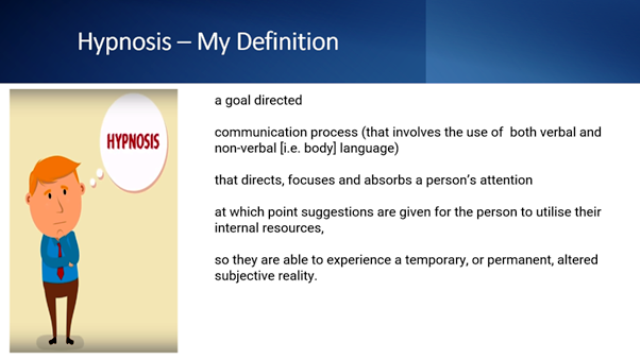Defining hypnosis is easier said than done. Despite being in use for over 150 years no one has yet arrived at a definition everyone in the field can unanimously agree upon. The definition I use in my work, is my own, based on my studies and my decade long experience of practicing as a professional hypnotist.
Here’s my no-nonsense definition

Let’s break this definition down line by line.
Hypnosis is goal directed
We engage in hypnosis with the intention of achieving a particular goal or outcome. That goal may range from simply relaxing for ten minutes to permanently gaining relief from chronic pain or chronic stress.
Hypnosis is simply a communication process
Hypnosis is not magic. It is simply a communication process (that involves the use of both verbal and non-verbal (i.e. body) language. It’s a communication process that you, as the person wanting to experience hypnosis, willingly and actively engage in with the hypnotist. Quite simply, if you don’t want to experience hypnosis, you won’t experience it.
Many people believe that hypnosis is something that’s ‘done’ to you by a hypnotist and as a result, you lose an element of control over your thinking and actions. The reality is the opposite. Hypnosis is an active, collaborative, process in which the outcome is more dependent on the actions of the person wanting to experience hypnosis than those of the hypnotist. As the one experiencing hypnosis you do most of the ‘work’ and always remain in control of the process.
Direct, focus and absorb attention
The instructions given to you by a hypnotist help you to focus and concentrate your mind on a specific idea. This is also called the ‘application of selective attention’. In the field of hypnosis this conscious selective attention is referred to as a ‘hypnotic trance.’
This intense focus is key to achieving the outcomes you want from hypnosis because whenever we focus on something intently, to the exclusion of everything else in our environment, we shift our mind into its natural learning state. We become more open to accepting suggestions our mind might otherwise have rejected.
Suggestions are given
Hypnosis has been called the art and science of suggestion. Once your mind is focused, it’s open to new learnings and ideas. The hypnotist helps you create the new learning you need, via suggestions. The suggestions are aimed at helping you achieve your stated goal and can involve the use of imagery, metaphors and stories.
Enabling you to utilise your internal resources
The resources you have available to you that you draw on during a hypnosis session include your:
- ability to experience everyday trance (see below)
- imagination
- memories
- emotions
- ability to mentally ‘step outside’ of yourself and observe yourself as if from a distance
You are already an expert at experiencing trance
All of us are capable of selective attention and therefore of naturally going into a state of ‘everyday trance’. We do it all the time. During an ordinary day we may enter a trance many times, such as when absorbed in a specific task; checking our phone; reading a book, watching our favourite TV program. And I’m sure you’ve had the experience of finishing a car journey and wondering how you arrived at your destination.
Experience a temporary, or permanent, altered subjective reality
The suggestions you accept during hypnosis can create a temporary change in your subjective reality. For example, you experience your hands being temporarily stuck together.
However, most people who work with a professional hypnotist are seeking a permanent change in the way they think, feel and behave. For example, the smoker who wants to stop smoking; the person experiencing chronic pain who wants to be pain free; the irritable bowel syndrome (IBS) sufferer who wants their symptoms to reduce; the chronically anxious person who wants to stop worrying. This is where the power of hypnosis and hypnotic suggestions lies, in helping people create long term change.
Are you curious to learn more about how hypnosis can help you?
If you want to explore how hypnosis can help you create the changes you want to make, simply click the button below to schedule a free 30 min Zoom or phone chat with me, where you can explore what’s possible. Alternatively give me a call or contact me today on 021 056 8389 or email tony@tycoaching.nz.
